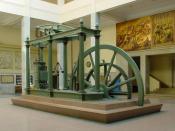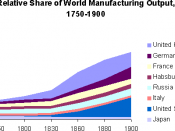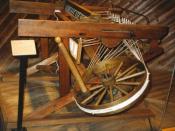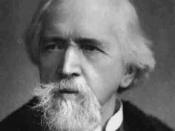Industrialization At the end of the 18th century, the growth in mechanical industry was budding all over the world, reinventing new technology that maximized the production of goods. This period influenced a number of new trends and ideologies all over, paving the road to the technological society in which we live today. This industrialization has made an enormous impact on shaping Canada in the 20th century.
Towards the end of the 1700's, new attitudes and ideas in religion and politics were challenging the traditional ways of thinking. Groups of people were disagreeing with the idea that god had ruled everything. For example, in the 1840's a social missionary named George Holyoake had argued against regular religious ideas and was put in jail for doing so. On contrary to Tom Paines' remarks in The Rights of Man that "religion teaches men to be good", Holyoake thought the only way to be good was through material acts.
These ideas aroused the idea of industrialization. Technology had begun by replacing manpower in Great Britain. Soon enough, a number of European nations were catching on with this notion. At an exhibition in Paris, Canadian politician Joseph Howe was amazed with the world's inventions and disgusted at how primitive Canada was at that time. It was time to follow in Europe's footsteps. Technology, transportation, machines and the production of goods and services were all growing gradually in Canada. People had begun to be more curious and motivated, resulting in new sources of power and new methods in increasing production. The elimination of tariffs further allowed industrial growth.
Parallel to the changes in traditional thinking that created the industrial growth, the industrial revolution had natural effects on society. To Canadians, their quality of life was changed dramatically. Wealth and productivity had increased. Not necessarily personal or household wealth was increasing. Instead large companies were expanding their businesses leaving little room for farming and the working class man. Before industrialization had begun, merchants were purchasing raw material and handing it out to their laborers who would create a finished product and give it back to the merchants to be marketed and sold. This was called handicraft work. Shortly after, inventors were tapping new methods of production and machinery that was replacing manpower. The factory was replacing the home as the main component of production. Men were performing single tasks in a factory that was producing goods on a large scale. To the average man, this idea was very appealing. Therefore, families were moving into cities, causing a shift in population from rural to urban areas. The farm was no longer the common experience; instead women, men and children were crowded into unsafe working conditions. Their daily habits had been altered. Rather then waking with the sun and carrying out tasks in accordance with the needs of the day they were operating by a clock.
The machinery had ruined employee-employer relationships. Prior to the 19th century people knew their employees well and usually had a personal relationship with them. They were now working under a very competitive basis. Employers were desperately trying to keep up with their competitors and expected their employees to do the same. Their goal was to increase production; therefore the workers were merely a pair of hands to be used when needed.
These conditions were creating new ideologies among intellects and politicians. The idea of socialism was emerging. Socialists had believed that industrial problems did not lie in the hands of politics but in a reconstruction of the economic and social system. Liberalism and conservatism were also leading powers. Liberals accepted humans as rational beings, whereas conservatives believed in tradition and wanted more government.
It was believed that the people at this time were beginning to envision a world that was generally more technological, intellectual and modern. Nations were in a race to become major world powers. In doing so, they need to be more advanced than the rest of the world. Cities, money, production and minds were expanding dramatically. Europe and North America were gaining new identities. Industry was shaping Canada into the nation it is today.





